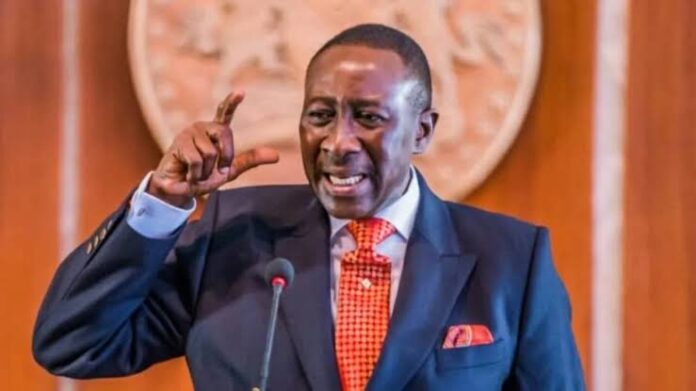*NSA laments, says FG observes Nigerians are tired, gravitating towards self-help
*Says it’s understandable people are averse, scared, worried, have no confidence
*Regrets Nigeria is in difficult situation but adds, FG is aware of people’s concerns
*Assures that Security Council is developing new strategy to end terrorism
By Mathew Dadiya, Abuja
The National Security Council has acknowledged the rising insecurity in the country, disclosing that they were working on new strategies to curtail the worsening insecurity as it observed that Nigerians are tired and gravitating towards self-help.
The National Security Adviser (NSA), Major General Babagana Monguno (rtd), declared this while speaking to State House correspondents after the Security Council meeting presided over by President Muhammadu Buhari yesterday at the Presidential Villa, Abuja.
Speaking alongside the Inspector General of Police (IGP), Usman Alkali, the NSA said that the country is in a difficult situation, saying that the President is aware of the people’s concerns about the growing insecurity.
Monguno explained that the Security Council has agreed on new strategies to curtail the menace, assuring that there will be a renewed momentum against terrorism.
He also disclosed that Council is in the process of winding up special investigation on Kuje Correctional Centre attack with a view to holding those found negligent accountable for their actions.
Monguno urged the media to be circumspect in what they publish from terrorists, appealing that they should consider the consequences of such materials.
The NSA lamented thus: “We are in a very difficult situation. And Council understands. Mr. President understands people’s concerns about the growing insecurity. But I can assure you that there’s no straight cut and dried method of dealing with this thing unless all of us embrace each other.”
“I know people are weary, people are tired people are beginning to gravitate to other places for self help. The truth is that help is rooted in everyone working for the other person.
“Today’s meeting was convened by the President as a continuation of the meeting that took place last week to discuss the technical issues and the tasking that were given to the various security agencies.
“The meeting deliberated on all those issues, after the brief by the National Security Adviser which is usually the procedure.
“Again, Council dims it necessary to inform the general public that fighting this type of asymmetric conflict is a collective effort. It’s not something that should be confined to only the security, intelligence and law enforcement agencies.
“When we keep saying whole of society approach, whole of government approach, to get a whole of nation approach, what it means is that everybody has to partake in this enterprise.
“The truth is that no country can ever overcome the difficulties of an asymmetric conflict by virtue of the fact that the enemy of the state is embedded within the population within the wider society. It is true that the local people are averse, they’re scared, they’re worried and there’s no confidence; that is understandable.
“But without their support, without the cooperation in terms of giving information, it makes it very hard for the operational elements. A few days ago, troops of the Guards Brigade were ambushed and decimated. Had there been a collective effort by way of just snippets of information we might have averted that incident, which is not to say that the responsibility is for those outside the security domain. It’s a collective responsibility.
“Furthermore, counsel is also concerned about the nature of media reporting incidents with regards to insecurity. It is important for the media to understand that certain reports being generated by the media, either the way, the manner in which they report can also aggravate this delicate situation.
“So Council is urging the media to be very careful in whatever it reports, whatever gets out to the public space can have a debilitating effect on the population.
“Equally, the political elite is also urged to take into account the consequences of utterances, especially from people who have established a reputation, people who are considered leaders of thought, people who are considered to have some kind of influence in society, whatever goes out, may be harmful, not just to the government, if that is the intention, which I doubt may not be a deliberate thing, but at the end of the day, it will affect the wider society.
“The members of the armed forces have also made a commitment that in the coming weeks; they have already started working on a new strategy to deal with these snippets of violence. And they’ve given their word their commitment to the President, that there will be a change in momentum, regardless of the fact that there might be certain institutional limitations which they face. But they understood the enormity of the responsibilities that they have.
“Again, Council is in the process of winding up the special investigative panel on the Kuje incident. And the idea is to come up with recommendations, hold those who are supposed to be held accountable for their deeds and to ensure that this type of thing never, ever, happens again in this country. That, in a nutshell, was what Council deliberated on”, he explained.







